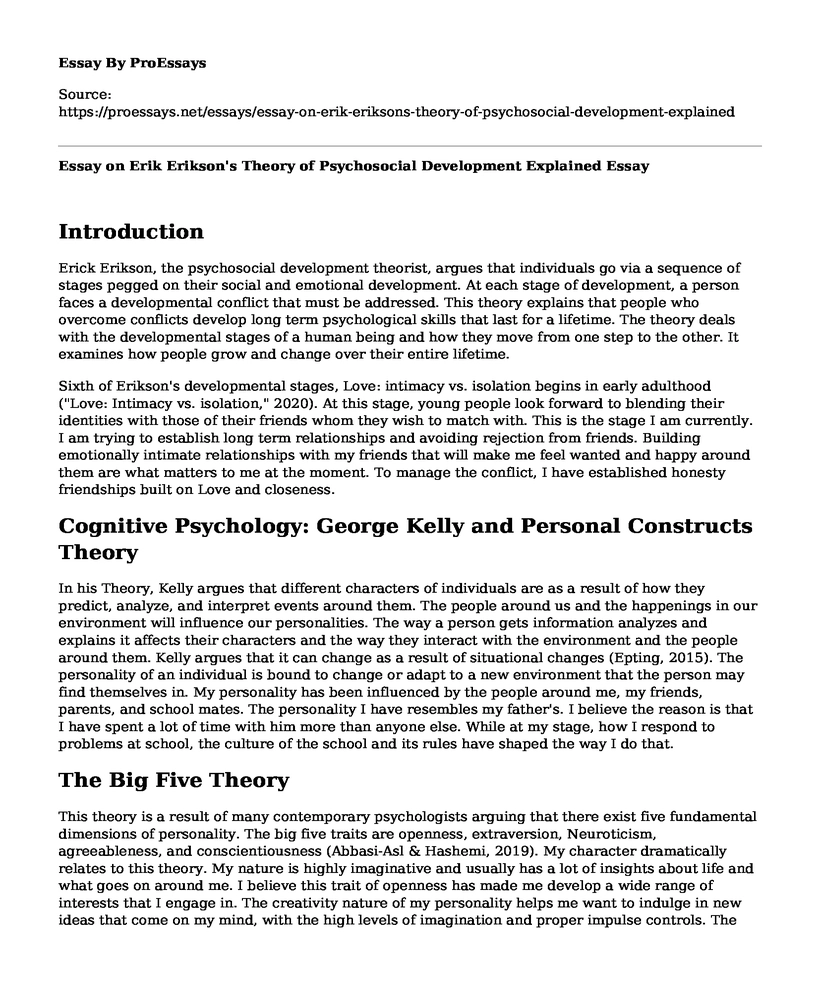Introduction
Erick Erikson, the psychosocial development theorist, argues that individuals go via a sequence of stages pegged on their social and emotional development. At each stage of development, a person faces a developmental conflict that must be addressed. This theory explains that people who overcome conflicts develop long term psychological skills that last for a lifetime. The theory deals with the developmental stages of a human being and how they move from one step to the other. It examines how people grow and change over their entire lifetime.
Sixth of Erikson's developmental stages, Love: intimacy vs. isolation begins in early adulthood ("Love: Intimacy vs. isolation," 2020). At this stage, young people look forward to blending their identities with those of their friends whom they wish to match with. This is the stage I am currently. I am trying to establish long term relationships and avoiding rejection from friends. Building emotionally intimate relationships with my friends that will make me feel wanted and happy around them are what matters to me at the moment. To manage the conflict, I have established honesty friendships built on Love and closeness.
Cognitive Psychology: George Kelly and Personal Constructs Theory
In his Theory, Kelly argues that different characters of individuals are as a result of how they predict, analyze, and interpret events around them. The people around us and the happenings in our environment will influence our personalities. The way a person gets information analyzes and explains it affects their characters and the way they interact with the environment and the people around them. Kelly argues that it can change as a result of situational changes (Epting, 2015). The personality of an individual is bound to change or adapt to a new environment that the person may find themselves in. My personality has been influenced by the people around me, my friends, parents, and school mates. The personality I have resembles my father's. I believe the reason is that I have spent a lot of time with him more than anyone else. While at my stage, how I respond to problems at school, the culture of the school and its rules have shaped the way I do that.
The Big Five Theory
This theory is a result of many contemporary psychologists arguing that there exist five fundamental dimensions of personality. The big five traits are openness, extraversion, Neuroticism, agreeableness, and conscientiousness (Abbasi-Asl & Hashemi, 2019). My character dramatically relates to this theory. My nature is highly imaginative and usually has a lot of insights about life and what goes on around me. I believe this trait of openness has made me develop a wide range of interests that I engage in. The creativity nature of my personality helps me want to indulge in new ideas that come on my mind, with the high levels of imagination and proper impulse controls. The nature of my personality and how I relate to my friends, paying attention to every detail of what they say is who I am. I can describe the significant five theories to my personality of loving interactions and always ready to start new conversations. Emotional stability and being relaxed assists me in my daily interactions with my friends. This has made me so likeable by my friends, and they rely on me to solve conflicts that may arise amongst us.
References
Abbasi-Asl, R., & Hashemi, S. (2019). Personality and morality: Role of the Big Five personality traits in predicting the four components of moral decision making. doi:10.31234/osf.io/6azqs
Epting, F. R. (2015). George Kelly. The Wiley Handbook of Personal Construct Psychology
(pp. 24-33). John Wiley & Sons, Ltd. https://doi.org/10.1002/9781118508275.ch3
Love: Intimacy vs isolation. (2020). Encyclopedia of Personality and Individual Differences, 2697-2697. doi:10.1007/978-3-319-24612-3_301485
Cite this page
Essay on Erik Erikson's Theory of Psychosocial Development Explained. (2023, Jul 24). Retrieved from https://proessays.net/essays/essay-on-erik-eriksons-theory-of-psychosocial-development-explained
If you are the original author of this essay and no longer wish to have it published on the ProEssays website, please click below to request its removal:
- Essay Sample on the Five Stages of Grief an Examination of the Kubler-Ross Model
- Honoring a Biological Connection Essay Example
- Essay Sample on The Power of Music: Enhancing Brain Development
- Paper Example on Patient's Health Conditions Confirmed: Excess Absences
- Essay Sample on Explaining Growth and Development: Bandura's Social Cognitive Theory
- Paper Sample on Socrates and Meno Debate Virtue: Is It Teachable?
- The Leadership Styles Survey and the Enneagram - Paper Example







